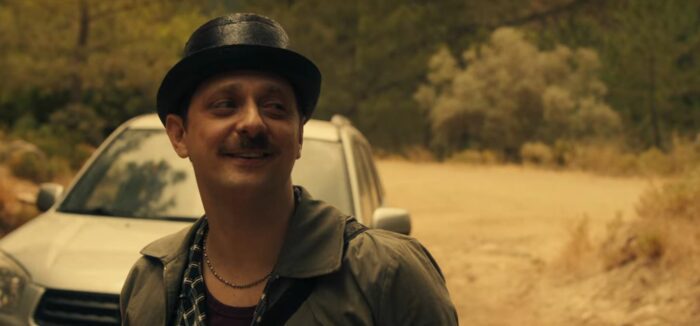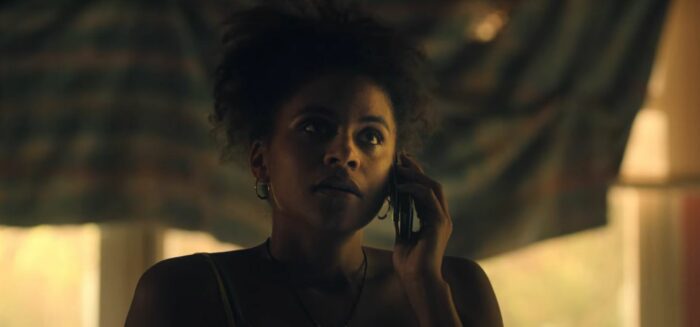The following recap and review contains spoilers for Black Mirror, “Mazey Day” (written by Charlie Brooker and directed by Uta Briesewitz)
When you think about it, it’s kind of messed up that anyone can just take your picture without your consent. It’s something I started thinking about a lot as social media took hold, where someone who is not me can post an image of me whether I like it or not. They might tag me, or the algorithm might tag me, and now it’s out there for the world to see, marked with my name and everything.
That’s about as close as I can come to saying anything I think is interesting after watching “Mazey Day,” and it barely relates to the episode insofar as it’s easy enough to craft a critique of paparazzi without questioning the ethics of photography in a general way, and indeed people have been doing that for a long time. There is really nothing respectable about what they do because what they do is invade people’s privacy. At best, your position might be that we have to allow their existence because we have no way of demarcating a line between public and private that would rule it out without problematically infringing on the freedom of the press. But I feel like we all got tired of worrying about all of this quite some time ago.

“Mazey Day” is set in 2006, which is marked by the announcement of the birth of Suri Cruise on the radio in its opening scene. That’s before the release of the first iPhone in 2007, so this episode of Black Mirror is without its titular black mirror at least in that sense. In the other, more metaphorical register, I suppose we do get a view into the darkness of the human soul, particularly when our paparazzi protagonists keep flashing pictures even as Mazey is turning into a werewolf, but there is nothing novel here.
Let’s recap the plot. Mazey (Clara Rugaard) takes mushrooms and gets drunk before doing a hit-and-run in the Czech Republic, which causes her to disappear from the public eye. A hefty sum of $30,000 is offered for the first photo of her. So our reluctant paparrazzo protagonist Bo (Zazie Beetz) tracks her to a rehab facility where she and some other, less reluctant paparazzi discover Mazey chained to a bed. They break her free just in time for her to transform into a wolf because there’s a full moon, and she proceeds to kill everyone (yay!) except for Bo (boo!) who also doesn’t have the decency to kill Mazey when she asks, but makes her shoot herself in the head while she takes a photo (boo!).

That’s it. I’d call it a tight 40 minutes, except the episode felt way longer than that. And the most interesting thing to explore probably would have been what would come next, as the legitimacy of the photographs would surely be questioned. The existence of werewolves was not publicly proven in 2006. I’d remember.
I’m really tempted to argue that “Mazey Day” is not an episode of Black Mirror, branding aside. It’s an old-hat werewolf story that doesn’t even twist that genre in any way worth talking about. I wanted the werewolf to kill everyone, but it’s hardly the first time I’ve rooted for the monster. Paparazzi are gross, but everyone knows that.
If Black Mirror offers precautionary tales pertaining to our use of technology, I guess the lesson here is don’t invade people’s privacy to take photos of them for money or you might get mauled by a werewolf.
Truly an important message for our troubled times.


But but but you left out the obvious homage (um, slice?) to TP, “well, there’s that”.
I’m afraid I don’t even know what you’re talking about enough to know if you’re being serious. I missed a reference to Twin Peaks?
“Oh, hey. You were right. Compliments to the chef. Mm-hmm. Thumbs up for the pecan pie, Jesse.”
“Goddamn.” Terry: “It’s good, right? Another satisfied victim. Goddamn, Jesse. Good to know. That’s what you ought to call that, “pecan perfection.”
I would, respectfully, argue that the level of euphoria from “this must be where pies die” was purposefully inserted into the script/performances of the above; I think they call it “vibes” these days.
Sure, why not? I can’t say as it makes me like the episode any better, but good call
As a co-admirer of Black Mirror I, likewise, was shocked (and laughed out loud) at Mazey’s transformation: it was both unexpected and unprecedented when comparing to any/all other episodes. An implausible outcome.
I won’t invoke “refreshing” because while it takes us off the traditional BM grid onto a well trod upon path, it remains, possibly defiantly, “surprising”. And, as with any artist who takes leave of the established, it must be allowed, if not applauded and or encouraged.
P.S. – if you want to see a “Black Mirror” vibe-like series check out the British show “The Capture”. The first season is good, the second even better and features Paapa Essiedu who co-starred as Gaap in the Season 6 episode, “Demon 79”. His presence alone is worth the watch, but there is so much more. Cheers.
Thanks, I’ll check it out!